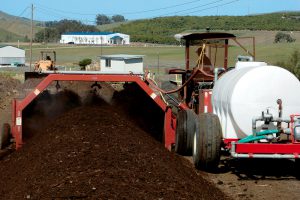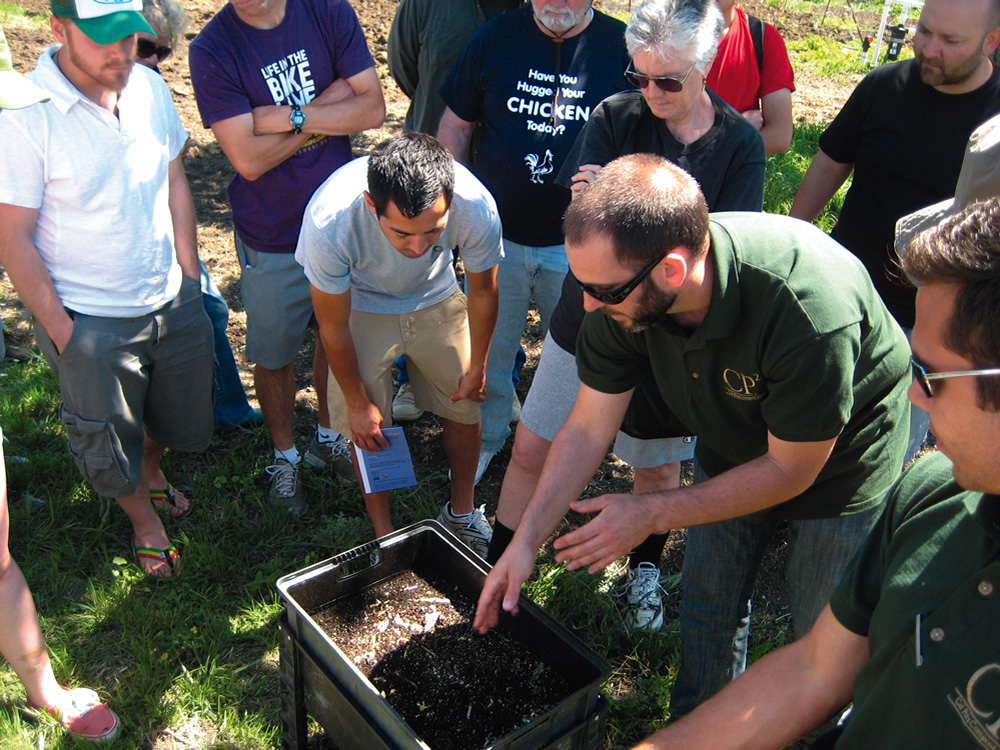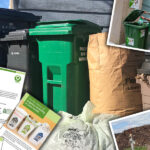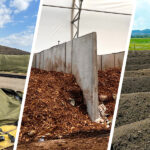California State Polytechnic University offers classes, trainings and hands on experience in composting and organic farming.
Ryan Cooper
BioCycle August 2014
Two composting champions at California State Polytechnic University (Cal Poly) in San Luis Obispo joined forces to help create a program dedicated to developing expertise in the realm of composting and related activities. Hunter Francis is the founder and director of the Center for Sustainability, which has the goal of reducing the ecological footprint of agricultural systems. Compost and Soil Health is one of the Center´s four main focus areas. Kevin Piper runs the Compost Unit in the Agricultural Operations Department at Cal Poly, which turns manures and agricultural wastes into high quality compost and bedding as part of the university’s organic farm.

The Compost Unit annually processes about 4,000 tons of horse, cattle and poultry manure, and 3,500 cubic yards of landscape trimmings. An HCL turner is used to manage the windrows. Photo courtesy of Cal Poly Center for Sustainability
In 2012, the Center for Sustainability worked with the Compost Unit to launch the Cal Poly Compost Project. The Compost Project consists of student internship opportunities, classes that inform the public about composting, and a professional training series. Student interns at the Center, called Sustainable Stewards, are responsible for increasing the sustainability of campus farming operations through project implementation and management, and volunteer recruitment. The Stewards also conduct compost outreach activities to increase awareness on campus.
The Center for Sustainability collaborates with 10 academic departments and offers a wide variety of majors. Francis coordinates classes in biological farming, biodynamics, permaculture, sustainable pest management, and more. As a part of his Masters studies, he developed Cal Poly’s first organic agriculture course, which in turn led to creation of the university’s organic farm. The Center helps Cal Poly accomplish its zero waste goals, while at the same time improving the sustainability of the greater community.
The Center for Sustainability, which officially opened in 2010, grew out of a student project started in 2000 called the Sustainable Agriculture Resource Consortium. The Center for Sustainability is located within the College of Food, Agriculture, and Environmental Sciences (CAFES), which is the third largest undergraduate program in agriculture and natural resources in the U.S. CAFES manages over 9,000 acres of farmland on two campuses.
The Center is largely self-supporting. Funding from the USDA´s Western Sustainable Agricultural Research and Education (SARE) Program made the Compost Project possible in 2012, with continuing support from the Harold J. Miossi Charitable Trust. Cal Poly is an extremely important place to spread the word about composting because of its strong ties to the agriculture industry in California. Having a composting facility on campus enables faculty to use the site to increase knowledge about the benefits of using compost.
Composting Unit
The Cal Poly Compost Unit is one of the largest university composting operations in the nation. Located on a 5-acre site, it annually processes roughly 4,000 tons of horse, cattle, and poultry manure, as well as 3,500 cubic yards (cy) of landscaping trimmings, producing around 2,500 cy of US Composting Council Seal of Testing Assurance (STA) Certified compost. At this point, food waste from campus is composted off-site.
The Compost Unit uses an active windrow system, a tractor-drawn compost turner, and a trommel screen at the end of the process. The finished product is used for dairy bedding and fertilizer for campus crops, pastures and landscaping on campus. Compost is also sold for $30/cy to local farms and for $8/bag to the public. The program provides the university with savings on waste hauling as well as soil conditioning and bedding costs.
Ryan Cooper, LEED GA, recently completed his Master of Science in Regenerative Studies at the John T. Lyle Center for Regenerative Studies, California State Polytechnic University Pomona.













